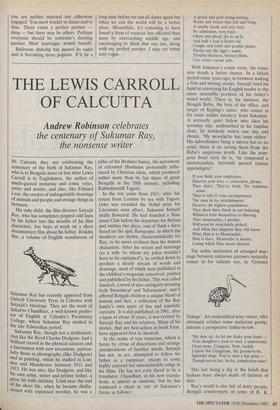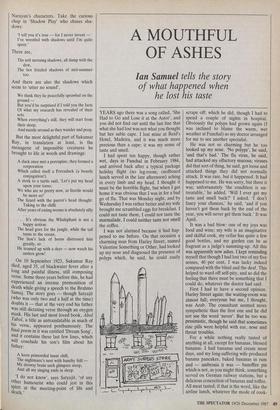THE LEWIS CARROLL OF CALCUTTA
Andrew Robinson celebrates
the centenary of Sukumar Ray, the nonsense writer
IN Calcutta they are celebrating the centenary of the birth of Sukumar Ray, who is to Bengalis more or less what Lewis Carroll is to Englishmen, the author of much-quoted nonsense and comic verse, satire and stories, and also, like Edward Lear, the creator of unforgettable drawings of animals and people and strange things in between.
His only child, the film director Satyajit Ray, who has sometimes popped odd lines by his father into the mouths of his film characters, has been at work on a short documentary film about his father. Besides this, a volume of English translations of Sukumar Ray has recently appeared from Oxford University Press in Calcutta with Satyajit's blessings. They are the work of Sukarto Chaudhuri, a well-known profes- sor of English at Calcutta's Presidency College, where Sukumar Ray studied in the late Edwardian period. Sukumar Ray, though not a mathemati- cian like the Revd Charles Dodgson, had a brilliant record in the physical sciences and a fascination with new inventions, particu- larly those in photography (like Dodgson) and in printing, which he studied in Lon- don and Manchester between 1911 and 1913. He was also, like Dodgson, and like his own artist, writer and printer father, a great hit with children. Until near the end of his short life, when he became disillu- sioned with organised worship, he was a pillar of the Brahmo Samaj, the movement of reformed Hinduism profoundly influ- enced by Christian ideas, which produced rather more than its fair share of great Bengalis in the 19th century, including Rabindranath Tagore.
In the ten years from 1913, after his return from London by sea with Tagore (who was awarded the Nobel prize for Literature soon after), Sukumar himself really flowered. He had founded a Non- sense Club before his departure for Britain and written two plays, one of them a farce based on the epic Ramayana, in which the monkeys are shown, characteristically for Ray, to be more civilised than the human characters. After his return and marriage (to a wife `to whom my jokes wouldn't have to be explained'), he settled down to produce a steady stream of words and drawings, most of which were published in the children's magazine conceived, printed and published by his father. This was called Sandesh, a word of nice ambiguity meaning both 'Sweetmeat' and 'Information', and it offered Bengali children a unique blend of fantasy and fact, a reflection of the Ray family's own spirit of fun and scientific curiosity. It is still published; in 1961, after a lapse of about 30 years, it was revived by Satyajit Ray and his relatives. Many of his stories, that are best-sellers in book form, have appeared first in Sandesh. In the realm of true nonsense, which is funny by virtue of distortions and strange juxtapositions of familiar words, Satyajit has not, as yet, attempted to follow his father as a composer, except in some highly enjoyed but untranslatable songs in his films. He has not even dared to be a translator. Chaudhuri, in his new transla- tions, is almost as cautious, but he has rendered a chant in one of Sukumar's farces as follows: A green and gold orang-outang, Rocks and stones that jolt and bang. A smelly skunk and izzy tizzy, No admission, very busy. Ghost and ghoul, do re mi fa And half a loaf is better far Coughs and colds and peanut plants, Pussies are the tiger's aunts, Trouble-shooters, blotted blobs, City centre vacant jobs.
With Sukumar's comic verse, the trans- ator stands a better chance. In a fallow period some years ago, in between making a film and writing stories, Satyajit tried his hand at conveying his English reader to the more accessible portions of his father's weird world. There is, for instance, the Bengali Babu, the boss of the office, and target of Kipling's satire, who comes in for some milder mockery from Sukumar. A normally quiet fellow who likes his noonday nap, undisturbed in his familiar chair, he suddenly wakes one day and shouts, 'My moustache has been stolen.' His subordinates bring a mirror but to no avail; there is no saving them from the Babu's suspicious wrath. Like the pom- pous head clerk he is, 'he composed a memorandum, herewith quoted (minus appendages)': If you think your employees Deserve your love — correction, please: They don't. They're fools. No common- sense.
They're full of crass incompetence.
The ones in my establishment.
Deserve the highest punishment.
They show their cheek in not believing Whiskers lend themselves to thieving. Their moustaches, I predict, Will soon be mercilessly picked; And when that happens they will know What Man is to Moustachio: Man is slave, Moustache is master, Losing which Man meets disaster.
The noble institution of arranged mar- riage between unknown partners naturally comes in for ridicule too, in `Groomy Tidings'. An unidentified nosy visitor, who obviously relishes some malicious gossip, informs a prospective father-in-law.
`My dear sir, do let me shake your hand Your daughter's soon to wed, I understand. Great news. Congrats. Now, luckily I know this Gangaram, the groom-to-be. Splendid chap. You've won a fair prize Though not so fair, ha-ha, complexion-wise!'
This last being a dig at the fetish that Indians have always made of fairness of skin.
Ray's world is also full of dotty people, Bengali counterparts of some of R. K. Narayan's characters. Take the curious chap in 'Shadow Play' who chases sha- dows:
'I tell you it's true — for I never invent I've wrestled with shadows until I'm quite spent.'
There are,
The soft morning shadows, all damp with the dew, The hot frizzled shadows of mid-summer too.
And there are also the shadows which seem to 'utter no sound',
We think they lie peacefully sprawled on the ground - But you'd be surprised if I told you the facts Of what my research has revealed of their acts.
When everything's still, they will start from their sleep, And nuzzle around as they wander and peep.
But the most delightful part of Sukumar Ray, in translation at least, is the menagerie of impossible creatures he brought to life in words and drawings:
A duck once met a porcupine; they formed a corporation Which called itself a Porcuduck (a beastly conjugation!).
A stork to a turtle said, 'Let's put my head upon your torso; We who are so pretty now, as Stortle would be more so!'
The lizard with the parrot's head thought: Taking to the chilli After years of eating worms is absolutely silly . .
. . It's obvious the Whalephant is not a happy notion: The head goes for the jungle, while the tail turns to the ocean, The lion's lack of horns distressed him greatly, so He teamed up with a deer — now watch his antlers grow!
On 10 September 1923, Sukumar Ray died, aged 35, of blackwater fever after a long and painful illness, still composing verse. Some three years before this, he had experienced an intense premonition of death while giving a speech to the Brahmo Samaj. The story goes — though Satyajit (who was only two and a half at the time) doubts it — that at the very end his father was still dictating verse through an oxygen mask. His last and most loved book, Abol Tabol, a title as untranslatable as much of his verse, appeared posthumously. The final poem in it was entitled 'Dream Song', and it contains these last few lines, which will conclude his son's film about his father:
A keen primordial lunar chill, The nightmare's nest with bunchy frill My drowsy brain such glimpses steep, And all my singing ends in sleep.
'I do not know', says Satyajit, 'of any other humourist who could jest in this spirit at the meeting-point of life and death.'











































































































 Previous page
Previous page